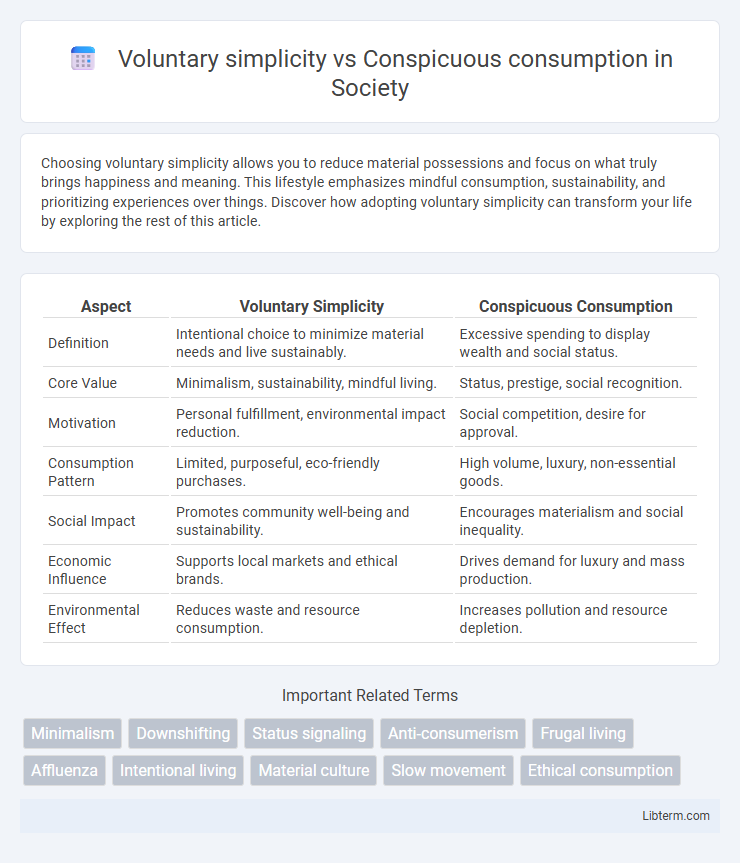Choosing voluntary simplicity allows you to reduce material possessions and focus on what truly brings happiness and meaning. This lifestyle emphasizes mindful consumption, sustainability, and prioritizing experiences over things. Discover how adopting voluntary simplicity can transform your life by exploring the rest of this article.
Table of Comparison
| Aspect | Voluntary Simplicity | Conspicuous Consumption |
|---|---|---|
| Definition | Intentional choice to minimize material needs and live sustainably. | Excessive spending to display wealth and social status. |
| Core Value | Minimalism, sustainability, mindful living. | Status, prestige, social recognition. |
| Motivation | Personal fulfillment, environmental impact reduction. | Social competition, desire for approval. |
| Consumption Pattern | Limited, purposeful, eco-friendly purchases. | High volume, luxury, non-essential goods. |
| Social Impact | Promotes community well-being and sustainability. | Encourages materialism and social inequality. |
| Economic Influence | Supports local markets and ethical brands. | Drives demand for luxury and mass production. |
| Environmental Effect | Reduces waste and resource consumption. | Increases pollution and resource depletion. |
Understanding Voluntary Simplicity
Voluntary simplicity emphasizes intentional living by minimizing material possessions and consumption to enhance personal well-being and environmental sustainability. This lifestyle prioritizes meaningful experiences, self-sufficiency, and reduced ecological impact over the status-driven acquisition evident in conspicuous consumption. Understanding voluntary simplicity involves recognizing its focus on conscious choices that foster contentment and community rather than societal pressure to display wealth.
Defining Conspicuous Consumption
Conspicuous consumption refers to the practice of purchasing and displaying expensive goods and services primarily to showcase wealth and social status rather than for intrinsic utility. This behavior often leads to excessive spending on luxury items, fostering social competition and materialism. In contrast to voluntary simplicity, conspicuous consumption emphasizes external validation and consumerism as markers of success.
Historical Roots and Evolution
Voluntary simplicity emerged from 19th-century transcendentalist movements, emphasizing minimalism and self-reliance as reactions against industrialization and material excess. Conspicuous consumption, coined by Thorstein Veblen in 1899, describes the display of wealth through lavish spending to attain social status, rooted in the sociocultural dynamics of the late Victorian era. Over time, voluntary simplicity evolved into a modern lifestyle choice promoting sustainability, while conspicuous consumption remains prevalent in consumer-driven capitalist societies.
Motivations Behind Voluntary Simplicity
Voluntary simplicity is driven by motivations such as the desire for reduced environmental impact, increased personal fulfillment, and escaping materialistic cultural pressures. Individuals practicing voluntary simplicity prioritize meaningful experiences and sustainable living over the accumulation of wealth and status symbols. These motivations contrast sharply with conspicuous consumption, which is fueled by social competition and the pursuit of external validation through visible displays of wealth.
Drivers of Conspicuous Consumption
Drivers of conspicuous consumption primarily include status signaling, social comparison, and the desire for prestige through material possessions. Economic factors such as disposable income, cultural norms, and advertising further fuel the pursuit of luxury goods and lifestyle displays. Psychological motivations like insecurities and the need for social recognition intensify the preference for conspicuous consumption over voluntary simplicity.
Psychological and Social Impacts
Voluntary simplicity promotes psychological well-being through reduced stress, increased mindfulness, and a stronger sense of purpose by prioritizing meaningful experiences over material possessions, fostering authentic social connections. In contrast, conspicuous consumption often leads to psychological distress such as anxiety and low self-esteem due to social comparison and the pressure to maintain status, while encouraging superficial relationships based on material wealth. Socially, voluntary simplicity supports community resilience and environmental sustainability, whereas conspicuous consumption can perpetuate social inequality and environmental degradation.
Economic Implications of Both Lifestyles
Voluntary simplicity reduces consumer demand, leading to lower economic growth and a shift toward sustainable markets that prioritize environmentally friendly products and local businesses. Conspicuous consumption drives higher economic activity through increased spending on luxury goods and status symbols, often fueling industries focused on non-essential, high-margin items. The economic implications reveal a trade-off between sustainability and growth, with voluntary simplicity promoting resource conservation and conspicuous consumption emphasizing short-term economic expansion.
Environmental Consequences
Voluntary simplicity promotes reduced resource consumption and minimal waste, leading to lower carbon emissions and decreased environmental degradation. In contrast, conspicuous consumption drives excessive use of goods and energy, contributing significantly to pollution, habitat destruction, and increased greenhouse gas emissions. Embracing voluntary simplicity can mitigate environmental impacts by prioritizing sustainable living and mindful consumption patterns.
Cultural Shifts and Global Perspectives
Voluntary simplicity promotes cultural shifts toward minimalism and environmental sustainability by encouraging individuals to prioritize meaningful experiences over material wealth, contrasting sharply with conspicuous consumption, which emphasizes status through the acquisition of luxury goods. Global perspectives reveal that while affluent societies increasingly embrace voluntary simplicity as a response to overconsumption and ecological concerns, emerging economies often experience heightened conspicuous consumption as a symbol of social mobility and success. These divergent cultural dynamics underscore the complex interplay between economic development, cultural values, and sustainable lifestyles worldwide.
Choosing a Path: Benefits and Challenges
Voluntary simplicity promotes mindful living by reducing material possessions and focusing on personal fulfillment, leading to lower stress and environmental impact. Conspicuous consumption emphasizes status through lavish spending, which can create social pressure and financial strain despite offering temporary prestige. Choosing voluntary simplicity fosters long-term well-being and sustainability, while conspicuous consumption often results in short-term gratification alongside potential debt and societal inequality.
Voluntary simplicity Infographic

 libterm.com
libterm.com